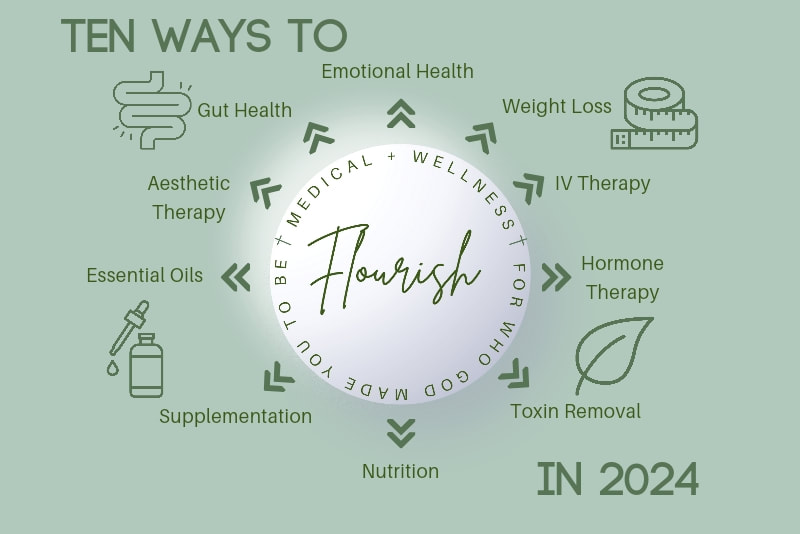And let's not forget about vitamin D, often called the "sunshine vitamin." Many of us don't get enough sun exposure, especially during the winter months or if we live in areas with limited sunlight. This can lead to a deficiency in vitamin D, which is crucial for bone health, immune function, and mood regulation. That is “why” you need to pay attention to the nutritional gaps in your food consumption, but let’s look at “what” you can do about it and “how” you can become healthier. Functional Medicine takes a holistic approach to health, focusing on finding the root causes of health issues rather than just treating symptoms. This approach considers factors like genetics, environment, and lifestyle, which can all impact our nutrient levels. How to increase your intake of vitamin B12, iron, and vitamin D // Add the following foods to your diet:
So, this National Nutrition Month, consider incorporating Functional Medicine and a balanced diet rich in whole foods into your health routine. At Flourish we use advanced testing to assess your nutrient status and offer recommendations to optimize your health through targeted supplementation. Professional grade supplements are available at the clinic, or you may order them from our online store.
In the midst of our bustling lives and convenience-oriented diets, it's crucial to shed light on the importance of heart health. February is Heart Health Awareness Month, a timely opportunity to explore comprehensive strategies, including functional medicine, for cardiovascular well-being. It's essential not only to focus on managing cholesterol but also to examine the potential negative impacts of relying solely on medication. Flourish's Approach to Addressing High Cholesterol:
Approaching heart health with lowering cholesterol as the goal, here are some considerations and healthy tips.Understanding Functional Medicine:Functional medicine, a holistic approach, seeks to address the root causes of health issues rather than merely treating symptoms. In the context of heart health, functional medicine takes into account various factors such as genetics, lifestyle, nutrition, and environmental influences to create a personalized plan for prevention and treatment. Tips for Lowering Cholesterol:
Nutrition Tips for Heart Health:
Considering Medication's Negative Impact: While medications can play a role in managing cholesterol, it's essential to acknowledge potential downsides. Medications may carry side effects, ranging from muscle pain to liver issues. Furthermore, relying solely on medication may lead to a false sense of security, potentially neglecting lifestyle changes that are crucial for long-term heart health.
At Flourish Medical + Wellness, we want you to thrive. That’s why we commemorate Heart Health Awareness Month and invite you to commit to prioritizing cardiovascular well-being. Functional Medicine, combined with lifestyle changes and nutritional adjustments, provides a holistic approach to heart health. Additionally, considering the potential negative impacts of relying solely on medication encourages a more balanced approach. By making informed choices, we can work towards reducing the risk of heart disease and fostering a healthier, happier life. Remember, your heart deserves comprehensive care, so take steps today and flourish tomorrow. Contact us to discuss your health concerns. At Flourish Medical + Wellness, we're all about making sure your body works at its best. We’re very aware of the research compiled over hundreds of years on how to keep people healthy and thriving. And we aren't fond of just extending life by taking meds every day to cover up symptoms. Our approach to medicine is all about helping you live long and stay healthy, as God intended. Here are ten ways to flourish as we partner with you in your wellness. #1 Weight LossAt FMW we believe that an effective weight loss program needs to be tailored to each individual’s lifestyle, health, age, and hormone levels. Therefore, we offer a variety of weight loss options in order to provide optimal results for each individual patient. With the goal of sustainable weight loss, the best approach is with a balanced and individualized strategy that considers factors like nutrition, exercise, mental well-being, and long-term habits. Restoring optimal hormone levels, testosterone, estradiol, and thyroid, is an integral part of a successful weight loss plan. This makes weight loss more attainable as well as sustainable! Learn more about FMW weight loss testing and treatments>> #2 IV TherapyIntravenous (IV) nutrient therapy is a treatment which includes ingredients like essential vitamins, minerals, and amino acids proven over decades to play a significant role in our health and wellness. IV nutrient therapy is a safe, effective, and restorative therapy used to aid in treating several medical conditions and to boost your immune system. Our IV therapy is customized to meet each individual’s nutritional needs and is administered directly into the veins which provides significantly more benefit than oral and traditional supplements and medications. Check out the benefits and our nutrient menu>> #3 Hormone TherapyHormone imbalance happens to both men and women and can have a significant impact on overall health and wellness. Hormones are one of the most important regulatory systems in the body. They function as messengers, interacting with specific target cells and organs to stimulate them into action. Hormone replacement therapy offers relief from many of the uncomfortable symptoms caused by a hormone imbalance. It can change your life! Read our patient’s stories>> Understand your options and learn more in the video from Jackie Tewes>> #4 Toxin RemovalGod designed our bodies to be able to detoxify and heal in most circumstances, however, with continuous toxin exposure and a lack of nutrient dense foods to nourish our bodies and support healing, those natural detoxification pathways can become blocked or stagnant. When this occurs, toxins build up inside the body and can cause diffuse inflammation, leading to disease processes. At Flourish, we offer thorough toxin testing and detoxification options. Discover the symptoms of toxin overload>> #5 NutritionWe have all heard (and likely tried) dozens of diets to help us achieve our weight goals. Nutrition means so many different things to each of us. The focus that we offer is to rely on natural, healthy foods that nourish our bodies in order to help us function optimally. Small, sustainable changes are the focus as they are often longer lasting solutions and easier to implement. That’s why we offer a handy (free) Food Swap Guide to make healthy grocery shopping a little easier. At Flourish, we also partner with you through holistic Functional Medicine methods. Perhaps intermittent fasting is an approach you’ve been wanting to investigate. We’ve got a great resource for you. #6 SupplementationOur best resource for nutrition should be food but there are many situations where we need to look at supplementation to enhance the amount of vitamins and minerals our bodies are receiving. Most American diets are full of refined carbohydrates and sugars and are insufficient in essential vitamins and antioxidants. This can leave you deficient in many key nutrients that are needed to prevent chronic disease, and to run all body systems effectively. A balanced diet provides a source of vitamins and minerals, but taking dietary supplements with your healthy diet is beneficial in ensuring your body has enough of the nutrients it needs each day. Our (free) Holistic Home Remedies booklet is a great place to start! And our supplement recommendations are available for you to purchase online or at our clinic. #7 Essential OilsEssential oils are concentrated extracts derived from various plants and have been used for centuries for their potential health and wellness benefits. While individual experiences can vary, here are some commonly reported benefits of essential oils: aromatherapy, stress and anxiety reduction, improved sleep, pain relief, immune system support, headache relief, skin care, natural air freshener, home cleansers, mood enhancement, and repelling insects. With so many benefits and essential oils to choose from, it’s a great way to flourish! You can learn more and order from our own doTERRA essential oil shop>> #8 Aesthetic TherapyAt Flourish, our definition of wellness encompasses all aspects of whole-person care, including physical, mental, and emotional wellness. Appearance can have a profound impact on wellness and how we interact with those around us. That is why we offer aesthetic treatments and have chosen to use the safest FDA-approved products to keep you feeling and looking your best. Botox® Cosmetic is the first FDA-approved treatment to improve frown lines, crow’s feet, and forehead lines in adults. The best results come from a well-trained medical provider who understands facial anatomy and musculature and customizes treatment to each individual patient. That's one of the reasons to schedule your Botox® Cosmetic treatments with us. Learn more>> #9 Gut HealthIn recent years, there has been a growing interest in the relationship between gut health and overall well-being. We now understand that the gut plays a central role in our health, impacting everything from digestion to the immune system and even mental health. One approach that's gaining traction in the pursuit of optimal gut health is functional medicine. At FMW we also know the increasing exposure to toxins in our environment can worsen symptoms. That is why we offer a parasite protocol. Parasites weaken the body’s natural defense mechanisms which allows for easier invasion by parasites. They may be the underlying trigger for a variety of chronic health conditions, like autoimmune diseases and irritable bowel syndrome. We offer testing and treatment! Learn more about parasite protocol>> #10 Emotional HealthTo flourish, we must place a priority on our emotional wellness. Our medical practice seeks to bring wholeness through physical, emotional, and spiritual healing. That’s why we offer more in-depth testing. If you have been struggling with physical, mental, or emotional symptoms that have no known or identifiable cause, a trapped emotion may be the cause. Working with the Governing Meridian energy pathway and applied kinesiology, these trapped emotions can be identified and removed, leading to healing and improvement or resolution of the associated symptoms. Learn more>>
We’ve shared a few of the ways you can flourish in 2024! Hopefully, you’ve discovered what makes us different from other medical clinics. Our personal approach to YOUR individual needs is the focus. And the treatments and plans we suggest for you aren't determined by insurance companies. Instead, we give you the care that fits you like a glove. We look at your symptoms, offer appropriate testing, complete a comprehensive assessment to determine your care plan. It's all about personalized care here at Flourish Medical + Wellness. Learn more about our Team and call us to schedule your first visit!
How toxins can enter our body:
Why it's important: Supports a Healthy Immune SystemToxins can weaken our immune system, making us more susceptible to illness and disease. A regular detoxification program can help to remove these harmful substances from our bodies and support the functioning of our immune system. This can help to boost our overall health and reduce our risk of developing serious health problems. Helps Maintain a Healthy WeightMany environmental toxins are stored in our fat cells, leading to weight gain and difficulty losing weight. Detoxifying your body can help to eliminate these toxins, allowing your body to function more efficiently and promoting weight loss. Improves Energy and Mental ClarityEnvironmental toxins can also affect our energy levels and mental clarity. A detox can help to remove these toxins, allowing us to feel more energetic and focused. This can have a positive impact on our daily lives, allowing us to be more productive and efficient. We offer Total Toxin Testing here at Flourish. Supports Better DigestionToxins can also disrupt the normal functioning of our digestive system, leading to symptoms such as bloating, gas, and constipation. Detoxifying your body can help to improve the functioning of your digestive system, promoting better digestion and reducing symptoms. Reduces Risk of Chronic DiseasesResearch has shown that exposure to environmental toxins can increase the risk of chronic diseases such as cancer, heart disease, and autoimmune disorders. Detoxifying your body can help to reduce your risk of developing these conditions by removing harmful substances from your body. Reducing our exposure to toxins can help us to maintain optimal health and reduce the risk of serious health problems. At Flourish, we offer a helpful list of daily, weekly, and monthly Detox Tips. Regular detoxification of your body from environmental poisons is essential to maintaining optimal health. By supporting your immune system, promoting weight loss, improving energy and mental clarity, supporting better digestion, and reducing the risk of chronic diseases, a detox can help you feel your best and lead a healthier, more fulfilling life. Consider incorporating a detox program into your routine to take control of your health and protect yourself from the harmful effects of environmental toxins. Get your Daily Toxin Handout>>
Set Realistic GoalsSet specific, achievable goals: Instead of setting a vague goal like “lose weight,” try setting a specific, measurable goal like “lose 5 pounds in the next month” or “walk 10,000 steps a day.” This can help you stay focused and motivated.
Eat a Balanced DietIt’s important to maintain a balanced diet for weight loss and provide tips for incorporating more fruits, vegetables, and lean protein into meals.
Incorporate Physical ActivityPhysical activity is essential to achieve and maintain weight loss. Here are some tips for finding enjoyable and sustainable ways to incorporate more movement into daily life.
Practice Mindful EatingIt is beneficial to pay attention to hunger and fullness cues and avoid distractions while eating. Here are some more benefits:
Get SupportFind support: Surround yourself with supportive friends and family members or consider joining a weight loss group or hiring a personal trainer or coach. Having support can help you stay motivated and accountable. At Flourish, we offer weight loss support. Contact us for more info! Here is a great resource we created to help you make good food choices. It’s our Easy Food Swap Guide ready for you to print>> Stay ConsistentConsistency is important in weight loss efforts because it helps to establish healthy habits and behaviors that can be sustained over the long term. When it comes to weight loss, it is often the small, daily choices that make the biggest difference. By making consistent efforts to eat a healthy diet, stay physically active, and practice other healthy behaviors, you can gradually and steadily lose weight and improve your overall health. By following these tips and finding what works best for you, you can achieve and maintain a healthy weight for a lifetime of good health. At Flourish, we will come along side you. Contact us for the guidance and support as a partner in your heath and wholeness.
Food Contamination
Water Pollution
Air Pollution
It helps to understand that toxins are fat soluble, meaning they are stored in our fat. This allows them to remain in our bodies for many years or decades. So, with continued daily exposure to even small amounts, the total amount of toxins in our bodies gradually increases. Toxins are also stored in the fatty tissues of animals and therefore are in the animal products we consume. Now, let's uncover the long-term effects of chemical exposure. PCBs (Polychlorinated Biphenyls)
Dioxins
DDT (Dichloro Diphenyl Trichloroethane)
Phthalates (Group of synthetic chemicals)
If we consider our exposure to heavy metals, we can see the effects on the enzymes that are crucial to produce our mitochondria. Mitochondria is an organelle found in large numbers in most cells, in which the biochemical processes of respiration and energy production occur. Our body's energy is particularly sensitive to the effects of heavy metals. And finally, we'll explore the sources and results of exposure to heavy metal toxins. Heavy Metals: Lead
Arsenic
Mercury
We paint a dark picture, but now that you are aware of the sources of toxicity, here are steps you can take to lessen your exposure. What You Can Do
If you are experiencing symptoms of inflammation or would like to know more about your personal exposure to toxins, call us to schedule a total toxin test to check for levels of toxin poisoning. We'll give you the resources and care you need. Source: Hypothyroidism Type 2, Dr. Mark Starr
|
Blog Categories
All
|
|
Flourish Medical + Wellness (FMW)
14070 Commerce Ave NE, Suite 300 Prior Lake, MN 55372 Phone: 952-208-7029 // Fax: 952-214-0866 Clinic Hours Monday through Thursday 8:30 - 3:30 "May you be blessed by the Lord who made heaven and earth." Psalms 115:15
|
|
©2021-2024 Flourish Medical + Wellness
|






